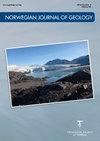Configuration of the Scandinavian Ice Sheet in southwestern Norway during the Younger Dryas
IF 0.8
4区 地球科学
Q2 Earth and Planetary Sciences
引用次数: 0
Abstract
The extent of the Scandinavian Ice Sheet in southwestern Norway is precisely located during the well-characterized Younger Dryas re-advance. However, the thickness of the ice sheet is less well constrained inland from the terminal position. Some exceptions include lateral moraines traced inland and up to 1000 m a.s.l. along Hardangerfjorden. Here, we apply 10Be dating in two areas: (1) bedrock and boulders in the high-relief landscapes near the Younger Dryas margin around the Bergen urban area, and (2) boulders from an upland 1600 m a.s.l. much farther (120 km) inland. We find that coastal summits ranging from ~400 to ~680 m a.s.l. and located only ~10–15 km up-flow from the ice margin, were covered by the Scandinavian Ice Sheet during the Younger Dryas. The scatter in the 10Be age population of 22 boulder samples is best explained by isotopic inheritance owing to inefficient subglacial erosion during the foregoing glaciation. Most of the 11 bedrock samples also exhibit inheritance, pointing to the source of inheritance in boulders and implying inefficient subglacial erosion during the last glaciation even in valley-bottoms near Bergen. Regional glacial striae compilations suggest that ice flow during maximum Younger Dryas ice-sheet configurations was for the most part cross-valley, with potentially low basal slip rates. Five new 10Be ages from the inland site help to constrain ice height far inland. We combine these new results with prior information to generate a cross profile of the Younger Dryas ice sheet in southern Norway.新仙女木时期挪威西南部斯堪的纳维亚冰盖的构造
挪威西南部斯堪的纳维亚冰盖的范围正好位于新仙女木期再推进期间。然而,从终端位置看,冰盖的厚度在内陆受到的约束较少。一些例外情况包括沿哈当厄峡湾向内陆和海拔高达1000米的侧冰碛。在这里,我们将10Be定年法应用于两个区域:(1)卑尔根城区附近新仙女木期边缘的高地形地貌中的基岩和巨石;(2)距离内陆更远(120公里)、海拔1600米的高地上的巨石。我们发现,在新仙女木时期,斯堪的纳维亚冰盖覆盖了海拔400 ~680 m的沿海峰顶,这些峰顶位于冰缘向上流约10 ~ 15 km处。22个10Be年龄的巨石样品的分散最好的解释是,在上述冰川作用期间,由于低效的冰下侵蚀,同位素继承是最好的解释。11个基岩样品中的大多数也显示出遗传,这表明遗传的来源是巨石,并暗示在末次冰期期间,即使在卑尔根附近的山谷底部,冰下侵蚀也是低效的。区域性冰川纹汇编表明,在新仙女木期最大冰原构造时期,冰流大部分是跨山谷的,潜在的基底滑动率较低。来自内陆地区的五个新的10Be年龄有助于限制内陆地区的冰高度。我们将这些新结果与先前的信息结合起来,生成了挪威南部新仙女木期冰盖的交叉剖面。
本文章由计算机程序翻译,如有差异,请以英文原文为准。
求助全文
约1分钟内获得全文
求助全文
来源期刊

Norwegian Journal of Geology
地学-地球科学综合
CiteScore
1.60
自引率
25.00%
发文量
0
审稿时长
>12 weeks
期刊介绍:
The Norwegian Journal of Geology publishes high-quality, fully peer-review papers from all geoscientific disciplines. Papers are commonly based on regional studies and should emphasise the development of understanding of fundamental geological processes. More specialised papers can also be submitted, but should be written in a way that is easily understood by nonspecialists, and illustrate the progress being made within that specific topic in geosciences. We also encourage initiatives for thematic issues within the scope of the Journal.
 求助内容:
求助内容: 应助结果提醒方式:
应助结果提醒方式:


